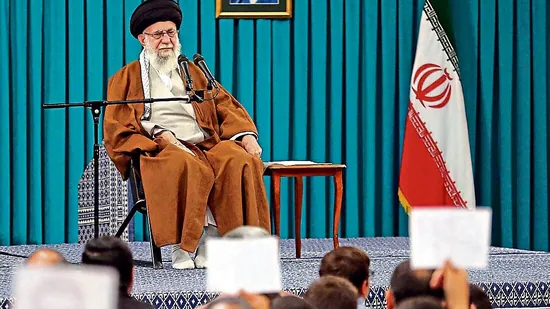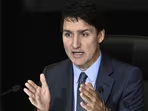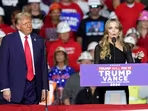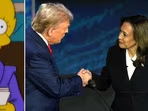Why President Raisi's death rattles Iran’s leadership succession plan
Elected as the President of Iran in 2021, Sayyid Ebrahim Raisi died in a weather-induced helicopter crash in Northwestern Iran on Sunday. The crash also killed Iran’s Foreign Minister Hossein Amirabdollahian, along with two other senior officials. As Tehran enters a five-day mourning period, with ceremonies at the Imam Raza Shrine in Mashhad, Raisi’s death marks the abrupt end of a career marked by hardline conservatism, prospects of being Ali Khamenei’s successor as Iran’s Supreme Leader, and a quiet fall from grace.

Eye on the Middle East | Ebrahim Raisi’s death ends a troubled presidency; rattles Iran’s leadership succession plan
Unlock exclusive access to the latest news on India's general elections, only on the HT App. Download Now! Download Now!A troubled presidency
In 2021, Iran’s Guardian Council (the vetting body for Presidential candidates) cleared the road for Raisi’s victory by effectively barring those who posed any credible challenge – even those from the conservative fold. Ebrahim Raisi, then the Chief Justice of Iran, was a veteran of Iran’s conservative judiciary, and infamous for having led the post-revolutionary trials of communist detainees in 1988 (through the so-called Death Commissions) which led to the massacre of hundreds of men, women, and children. Affiliated with the conservative Combatant Clerics Association and a designated favourite of Supreme Leader Ali Khamenei, Raisi took over the Presidency at a time when his reformist predecessor (Hassan Rouhani) was counting the nails in his own political coffin due to several domestic gaffes and the significant failure of the US-Iran nuclear deal; Trump’s unilateral withdrawal from that agreement meant a loss of credibility for the reformist President who had gambled on sanctions relief.
As his reformist opponents licked their wounds in a system that was growing even more conservative, Raisi entered the Presidency both free to run a hardline government, and forced to deal with a debilitating economic crisis. At the end, he was plagued both by success in the former and failure in the latter. Having long dealt with alleged dissidents and subversives himself within the judiciary earlier, the Raisi Presidency witnessed the Mahsa Amini protests that rocked Iran during late 2022 and early 2023 (evidently discomforting Khamenei as well). Both during and after the protests (which snowballed into larger dissent against the political establishment as most protests in Iran historically have), Iran’s morality police faced numerous allegations of extrajudicial killings and disappearances, amidst other crimes. And Raisi categorically failed to uplift the economy.

Ministers from across his cabinet resigned (ostensibly) in quick succession right from 2022, with each having struggled with effective policy implementation. For instance while Welfare Minister Hojjatollah Abdolmaleki failed to keep up pensions amidst rising inflation, Education Minister Yousuf Nouri could not tackle a crisis of wages. Two years into his Presidency, several hardline parliamentarians (such as Gholamali Jafarzadeh and Mehdi Asgari among others) themselves publicly termed Raisi “the worst president ever” who could be Iran’s “first one-term President”. By 20th March 2024, Khamenei himself hinted dissatisfaction at the administration’s handling of the economy in his annual Nowruz speech.
Succeeding the Supreme Leader
Even as the Raisi Presidency unraveled (with the Presidential polls set for late 2024), the larger question that loomed, and is now in sharper relief, is -- who is to succeed Ayatollah Ali Khamenei’ (85 years old) as the next Supreme Leader? Ostensibly appointed by the Assembly of Experts (with Raisi as a member since 2016), the office of Supreme Leader is technically held for life – meaning that Iran has seen only one succession since 1979 (that of Khamenei in 1989). By 2021, with the death of influential veterans of the revolution who could contend for the post, Raisi became one among the front-runners to succeed the octogenarian Khamenei; Raisi held key financial posts too – including the guardianship of the Astan Quds Razavi and the Setad Ejraiye, as shown by Sanam Vakil for the Atlantic Council. Among his contenders for the top post, has been Khamenei’s son – Mojtaba Khamenei (who has kept himself in the wings, avoiding the risky optics of a potentially hereditary succession).
With Raisi’s Presidential failures, there was more grist for Mojtaba’s succession mill, even as the desire to avoid a hereditary succession was well evident in statements by leaders such as Ayatollah Mahmoud Araghi (Assembly of Experts member) who shot down the possibility as recently as 2024. Both Iran’s first Supreme Leader (Ruhollah Khomeini) as well the incumbent have hankered against monarchy-resembling succession structures. Notwithstanding the question of succession, there is strong precedent within Iran to bend constitutional structures to suit establishment favourites. For instance, for the office of the Supreme Leader itself, Khomeini had authorized an amendment enabling junior clerics (not of Ayatollah rank) as eligible for the office after falling out with his protégé – Hussein Montazeri – over the latter’s criticism of the 1988 massacres (which Raisi oversaw). This in turn enabled Ali Khamenei to take over. Hence, even while the long-term question of the Supreme Leader’s succession looms, it is unlikely that Raisi’s death has caused any extraordinary turmoil – the regime may now choose to abide by the Constitutional requirement of holding Presidential elections in the next 50 days, or continue with Mohammad Mokhber as acting President until the scheduled polls later in the year. Essentially, the regime remains bound by its principal objective of survival, reflected in the tight control it exercises over Presidential elections. All other instruments of polity cater to this objective. As the influential conservative cleric Mesbah Yezdi once stated, elections in Iran only occur because the Leader permits them, and the electoral outcome can be accepted or rejected by the latter. In any case, hardliners within Iran have further consolidated power in Iran with the 2024 Parliamentary elections having thrown up a conservative majority (after the lowest voter turnout in its history).
Raisi chopper crash: Pope Francis sends 'assurance of spiritual closeness' to Iran
Impact on foreign policy
Lastly, Raisi’s death is unlikely to fundamentally alter the direction of Iranian foreign policy, especially amidst Israel’s continuing bombardment of Gaza (which has now killed over 38000). The real disruption rather is to Tehran’s abilities (defined in the person of its diplomats and generals) rather than its intentions. Compared to Raisi, it is Abdollahian’s death rather that takes out another skilled diplomat well-seasoned in engaging key neighbours, and a close affiliate of Maj Gen Qassem Soleimani (Iran’s most influential general, killed by a US airstrike in 2020). Abdollahian’s loss comes on the back of a number of other losses Iran has taken to its clique of senior coordinators – with the death of at least three IRGC generals in an Israeli strike in Syria in April, including Brig Gen Reza Zahedi (the second highest ranking IRGC official killed after Soleimani).
The author is a research associate at the Council for Strategic and Defense Research, New Delhi, and a South Asia Visiting Fellow at the Stimson Center, Washington DC. The views expressed are personal.
Disclaimer: The copyright of this article belongs to the original author. Reposting this article is solely for the purpose of information dissemination and does not constitute any investment advice. If there is any infringement, please contact us immediately. We will make corrections or deletions as necessary. Thank you.
Title:Why President Raisi's death rattles Iran’s leadership succession plan
Url:https://www.investsfocus.com









